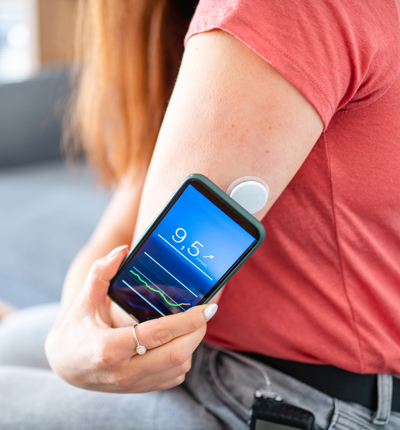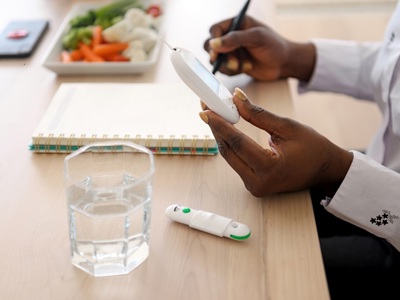
Continuous Glucose Monitors: a diabetic’s dream or nightmare?
In Diabetes Awareness Week, Tina Patel and Charlotte Tapang discuss the issues surrounding Continuous Glucose Monitors (CGMs) and potential health implications.
Posted on 14 June 2021
According to Diabetes UK, one in ten people aged over 40 in the UK are now living with Type 2 diabetes where the body does not produce enough insulin, or the body's cells do not react to insulin.
Despite ongoing advances in medications, diabetes management and technology, the need for diabetics to regularly check their blood glucose levels, was managed most reliably by fingerprick tests.
However over the past decade advances in technology and the development of newer CGMs has eliminated the requirement for fingerstick glucose checks for many diabetics.
The CGM market leader is Dexcom. The approval six years ago of the Dexcom G5 Continuous Glucose Monitor was a key step in these advances although now even the G5 has been overtaken by the G6 and G7 models. This just shows how quickly the technology changes.
A CGM is is a small device worn just under the skin to measure glucose (sugar) levels continuously and send the results to a display device.
It enables the user to analyse their results and see patterns in their sugar levels, which will over time give them a better understanding of their diabetes and how best to manage it.
However, these monitors are not readily available on the NHS. According to the NHS website only those who meet certain criteria (set out by NICE) will be eligible to qualify for a CGM. Some, clinics lend CGMs for a short time to help people look for patterns in their blood glucose levels if they are struggling. The cost is £1500.00 plus the monthly £120 cost of the sensors.
Advantages of using a CGM
- The user can track their sugar levels all through the day and night
- Settings allow the user to create an alarm when levels are high or low
- Enables users to understand and manage their diabetes better
Disadvantages of using a CGM
- Glucose levels may not be accurate and can give false readings
- With some models you still need to do some finger prick testing
- A skin puncture is required each time for insertion of the glucose sensor
- Annoying to have the device strapped to the user’s body
As life-changing as these devices may be for those with diabetes, they are not without problems. Many users of CGMs have reported various issues such as skin rashes to the adhesives on the sensors, difficultly removing sensors, device falling off, sensors malfunctioning, silencing of alarms if smartphones are on vibrate or silent mode, and inaccurate readings.
There have been numerous voluntary recalls over the years in relation to these devices following increasing complaints from users. If left in circulation, these can cause harm to users, in some circumstances the failures can have catastrophic consequences with users having hypoglycaemic episodes.
Due to the number of complaints that people have raised following the use of CGMs it would be easy to place all the blame on the product itself. However, the issue is much wider than that.
One of the issues that has arisen is that the product is not very user friendly. User guides can be confusing, and demonstrations can be too quick, so users are resorting to “YouTube” videos on how to use them. More training needs to be given to users so that they have clear understanding on how to use the device correctly and safely.
It is evident that a lot more needs to be done to ensure that the product is as close to 100% accurate as is humanly possible and that more NHS Funding is allocated to CGM’s.
Perhaps a joint effort by the companies who make and produce CGM’s and the NHS is needed to ensure that NHS staff have a greater understanding of the product so that this knowledge is then passed on to the user.

Consumer, competition and financial services claims
See how our leading UK consumer law lawyers can help

Lawyers investigate potential device defects after recall of Dexcom Glucose Monitoring systems
Leigh Day are investigating potential defects with Dexcom products and are currently representing a client who suffered injury following the use of the Dexcom G5TM Mobile/G4® Platinum CGM system.


